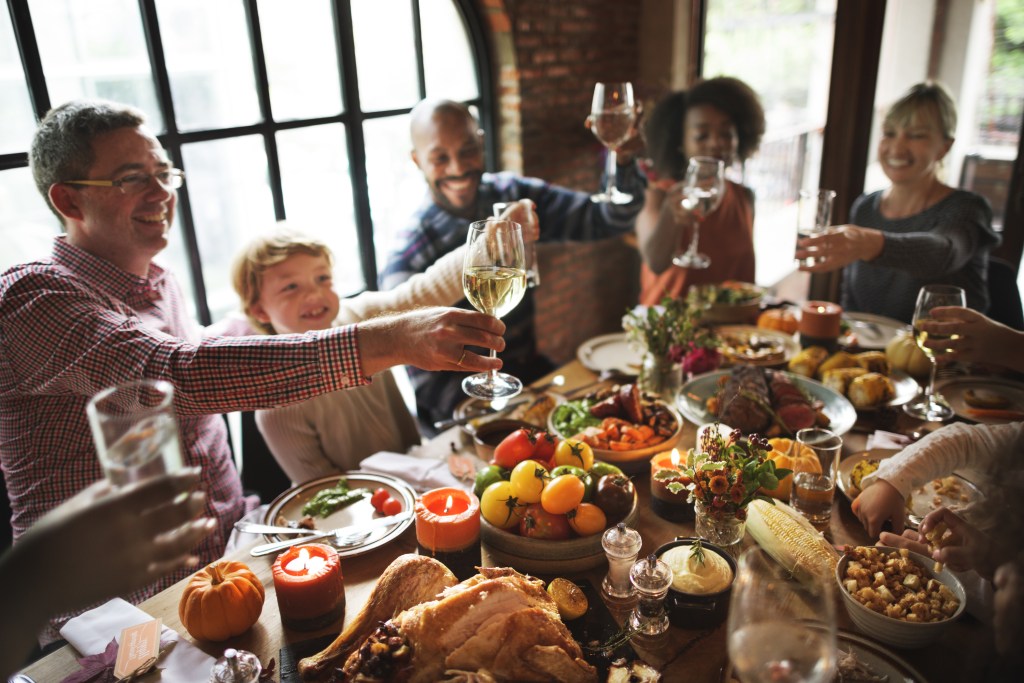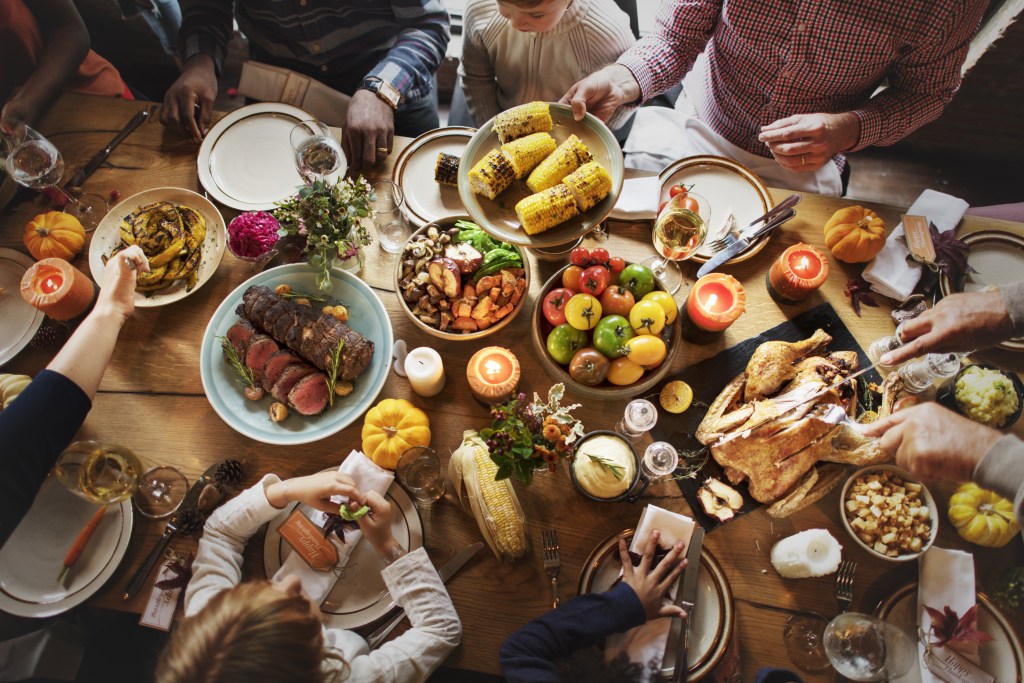No one ever issued a Thanksgiving invitation by saying “Please join us for a main course of arguing, accompanied by sides of heated debate, served up with ongoing disputes.” But for many Americans, that’s just what ends up getting dished out alongside the turkey, mashed potatoes, and stuffing.
For some of us, discord is a not-so-cherished Thanksgiving tradition — and one that can have us stressing before, during, and after the main event. The key to coping with family differences is knowing why they arise and then developing strategies to deal with them if they occur. Read on for some insight into how to bring harmony to the holiday gathering.
Home isn’t always so homey
Old squabbles tend to arise during holiday gatherings for a variety of reasons, according to Stephanie D. Preston, a professor of psychology at the University of Michigan. “Some relatives who are not on the same page only see each other at holidays, so this is the moment when any clash that is forestalled by distance will arise,” she says. “Another factor is stress and fatigue. People often travel long distances, are juggling their kids, sleeping in uncomfortable places, or being responsible for too much of the cleaning and cooking. These stressors can create a pressure cooker of an atmosphere that is ripe for an explosion.”
Returning to the home one grew up in can also make past feelings rise to the surface again, says Pauline Wallin, Ph.D., a licensed psychologist with a private practice. “There are all sorts of subtle cues, such as sounds, sights, and smells, that re-open old wounds from childhood experiences and family communication patterns — jealousies, betrayals, rejections,” she says. “This is especially true if you are returning to your childhood home for Thanksgiving. When family gets together, old feelings tend to get triggered, which is why we sometimes behave like 12-year-olds, arguing over small things, such as who gets to sit in which chair.”
Not surprisingly, alcohol also frequently lends fuel to the disagreement fire. “Still another reason that people argue on a holiday is because they are imbibing, lowering their inhibitions, and feeling bold or uninhibited from finally telling someone how they feel,” says Preston.
How will the pandemic come into play?
With the pandemic raging in 2020, many of us celebrated Thanksgiving differently. A survey of registered voters last Thanksgiving found 44% of respondents said they didn’t intend to see anyone outside their household, and 22% said they planned to gather with a smaller group of people than usual. Whether absence will make our hearts grow fonder for 2021 gatherings depends on what the dynamic was pre-pandemic, according to Wallin.
“It may feel a bit awkward at first, especially if you haven’t seen or talked to your family members since the last holiday gathering,” says Wallin. “But then people will tend to fall into their old patterns of interaction, whether harmonious or discordant.”
How much time you did or didn’t spend with your loved ones during the pandemic can help you prepare for the tone your gathering might take, advises Preston. “Some people really missed family and will relish this opportunity. For those people you want to savor the moment and express your gratitude that you can be together again,” she says. “Other people were with family much of the year and might even be sick of each other after so much time isolated together. Those people will want to find a new way to freshen things up this holiday so that it doesn’t just seem the same as every other dinner you had together, maybe go for a hike, participate in a 5K, or have a dance party after dinner.”
Then there’s politics …
It’s not an understatement to say the political climate has never been more heated than it is now, with many families experiencing new rifts over the past several years. Add in all the above-stated reasons holidays can stir up discontent, throw in a dash or two of politics, and you have a recipe that will probably end up boiling over — or blowing up.
One recent study found that Thanksgiving dinners attended by residents from opposing-party precincts were 30 to 50 minutes shorter than same-party dinners, and that family members may have cut things short to avoid contentious topics, or simply have talked less.
Religion and politics are topics where one should tread lightly, says Preston. “One thing we can be pretty sure of is that you cannot change someone’s mind by being combative during an argument,” says Preston. “For many families, it is necessary to just avoid talking about it altogether if you are pretty sure that their views strongly differ from your own and you have not had a successful dialogue about this in the past.”
If you do need to discuss a hot topic, Preston says it’s important to be compassionate and respectful. “People do not respond with an open mind when they are insulted or backed into a corner, but sometimes they do if you just share how you feel and ask them how they feel and why in a respectful manner that is clearly non-combative,” she says. “If you aren’t up to the challenge of being respectful when they express their view, it’s better not to engage in a dialogue in which you hope to change their mind, but you can still express how you feel if you simply want them to know where you are coming from, or why you are wearing a mask or sitting out, or something.”
If bringing up masking, vaccinations, religion, or politics is likely to end up with everyone wanting to sling mashed potatoes at each other, it’s best to lay ground rules ahead of time that those topics are taboo, says Preston. “These people maybe could talk to family in advance about making a truce for the holiday, deciding that you and your allies will not bring up the issue, create a rule about how to keep people safe that everyone can agree to, or, if needed, maybe just skip it this year and send your polite regrets. No need to dig the hole any deeper at this moment,” she says.
Tips to bring to the table
While every gathering has its own dynamics, there are some common scenarios that tend to occur. Here’s how you can cope with three of them:
Being part of a heated discussion. Whether it’s with the infamous drunken uncle or someone not so stereotypical, there are strategies you can use if you find yourself part of a conversation that’s going downhill. If someone is attacking or criticizing you, Wallin suggests asking yourself if the comments reveal more about you or the person saying them. “This will help keep you calm so that you can respond like a grownup. Then change the subject. You can do that in a non-confrontational way by simply saying, ‘Next,’” she adds.
If that doesn’t work, it’s OK to tap out. “A good rule of thumb is that if you cannot keep your own head cool and you cannot stay in a place of empathy and love, that you should consider withdrawing from the discussion or asking if it can be tabled for another time, or after dinner, or on a walk,” says Preston.
Observing an out-of-control conversation. If you find yourself an innocent bystander, first try ignoring the argument and finding something else to do like clearing dishes, suggests Wallin. “To distance yourself emotionally, pretend you’re watching a movie of the heated conversation. You can make a game of it by predicting how the script is going to proceed,” she adds.
If it’s necessary to intervene, be diplomatic and suggest the issue be tabled or talked about later when everyone calms down, advises Preston. “But it is also important not to prevent people from having a discussion just because you feel a little uncomfortable. On the other spectrum, ‘toxic positivity’ can occur that sets too low of a bar for what constitutes a conflict, whereas the adults at the table are capable of keeping things in check and need to air some concerns or feelings,” she adds.
Worrying what might happen. Are the ghosts of Thanksgiving past playing on a loop in your head? You’re definitely not alone. “The problem is that many people start stressing weeks in advance, recalling previous hurtful moments and repeatedly imagining what will happen at the upcoming gathering,” says Wallin. “In a sense, they are rehearsing, over and over again, how bad it’s going to be. Thus, for a potentially stressful event that will last a couple of hours, you can end up spending dozens of hours over a period of days or weeks, anticipating and re-experiencing bad feelings, and getting yourself all worked up long before you walk through the door.”
If this sounds familiar, Wallin says a good coping mechanism is to repeat mantras in your head when you start “rehearsing,” such as “It’s just for a couple of hours” or “I’ve endured much worse experiences.”
It’s also smart to create a game plan to rely on if things go awry, says Preston. “Anticipate what might occur this year, based on who will be there and how people are feeling at this time. When you know that it’s a recipe for disaster, maybe reach out to the person or an intermediary to discuss a strategy to keep things merry, plan ahead with your ally for when to pull the ripcord, and go for that nice fall walk,” she says.
That plan can also include what you will or won’t do if an anticipated stressor occurs — for example, “Aunt Bertha will probably comment that I’ve gained weight. If she does, I’ll simply agree with her, ‘Yes, I have,’ and then change the subject,’” says Wallin.
Finally, remember that despite the flaws and differences, most of us really do care for the crew we call “family.”
“People generally love their family deeply and yet do not all share the same beliefs on the variety of powder keg topics that we have been dealing with for the past couple of years,” says Preston. “But rather than focus only on the division, focus on how much you love each other, that you want the best for each other, and that ultimately your concerns usually come down to health and well-being, which you want for everyone.”
BlissMark provides information regarding health, wellness, and beauty. The information within this article is not intended to be medical advice. Before starting any diet or exercise routine, consult your physician. If you don’t have a primary care physician, the United States Health & Human Services department has a free online tool that can help you locate a clinic in your area. We are not medical professionals, have not verified or vetted any programs, and in no way intend our content to be anything more than informative and inspiring.







